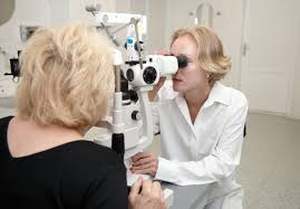

MedFriendly®


Optometrist
If you need someone to prescribe eyeglasses or
contact lenses for you to help correct visual problems,
chances are that you would go to see an optometrist.
An optometrist is a doctor that specializes in optometry,
which is the science that deals with assessing,
diagnosing, treating, and managing the eye and related
structures for visual difficulties (such as
nearsightedness of farsightedness) and eye disorders
(such as cataracts).
FEATURED BOOK: Optometry: Science, Techniques, & Clinical Management
Cataracts is a darkening of the lens in the eye. The lens is an organ located between the
colored part of the eye, that bends light as it enters the eye.
Optometrists examine the inner and outer structure of the eye, use vision testing, vision
training, eye exercises, and prescribe corrective devices such as eyeglasses and
contact lenses. Optometrists also need to be aware of the many different problems
throughout the body (such as high blood pressure) and various diseases that can cause
visual difficulties.
The optometrist's goal is to make the patient's vision the best it can possibly be. For
example, optometrists help patients coordinate and focus their eyes better, see color
better, and judge depth better. An optometrist is given the title, O.D., which means Doctor
of Optometry.
"Where Medical Information is Easy to Understand"™
WHAT IS THE DIFFERENCE BETWEEN AN OPTOMETRIST AND
AN OPHTHALMOLOGIST?
Unlike ophthalmologists, optometrists do not have an MD (medical
doctor degree). Rather, optometrists earn a Doctor of Optometry
degree. The distinction is somewhat blurry (no pun intended). Both
ophthalmologists and optometrists diagnose and treat eye diseases,
but ophthalmologists focus much more on eye surgery. There are
some optometrists who can perform certain eye surgeries, but this
is done in very limited circumstances, and generally after being
trained by an ophthalmologist.
Optometrists generally focus on prescribing eyeglasses and contact lenses and provide most people's
primary vision care. Both ophthalmologists and optometrists can prescribe medications to diagnose and
treat eye diseases. However, ophthalmologists have more free range to prescribe medications, as they
hold a more general medical degree.
HOW DOES SOMEONE BECOME AN OPTOMETRIST?
To become an optometrist, one first needs to have completed at least 3 years of schooling at an
accredited college or university. Then one needs to attend an approved college of optometry, which lasts
4 years. Most who enter a college of optometry have a Bachelor?s Degree or higher. The 4 years of
optometry school involves working with patients and doing extensive coursework about the visual system
and visual disorders. General medical training is also provided to help the student learn about various
structures, functions, and diseases of the body. Optometrists are also trained in optics, which deals with
the science and light of vision. They are also trained in how to design, construct, apply, and fit corrective
lenses onto patients to improve vision. Corrective lenses are man-made devices that bend light in a
specific way to improve vision.
There are approximately 20 accredited schools and colleges of optometry in the U.S. and Canada, which
can be found by going to the American Optometric Association website. Additional information can be
found at the Association of Schools and Colleges of Optometry website. To become an optometrist, one
also needs to pass state medical examinations and a national examination. All states require optometrists
be licensed before offering services to the public. Both of these professionals are different from opticians,
who dispenses (and sometimes construct) corrective eye wear (e.g., eyeglasses).
WHERE DOES THE WORD OPTOMETRIST COME FROM?
Ophthalmologist comes from the Greek word "optikos" meaning "sight," and the Greek word "metron"
meaning "measure." Put the two words together and you have "measure sight," which is what optometrist
do.















